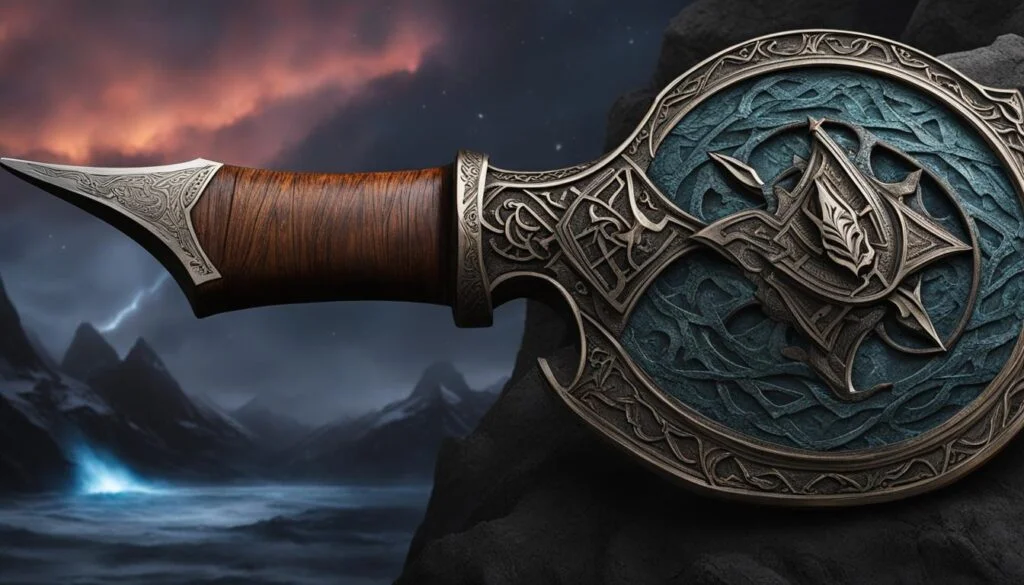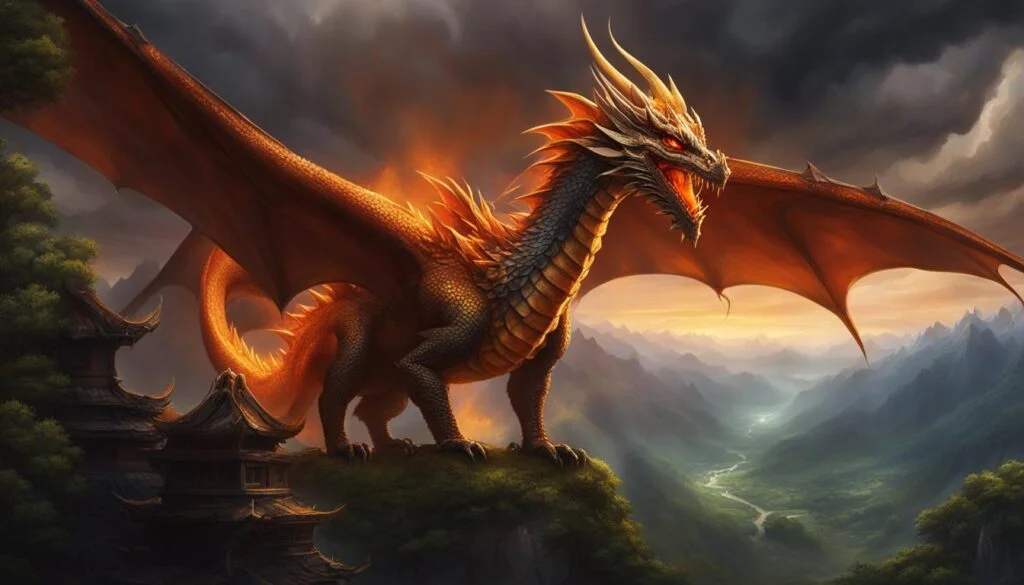Welcome to our exploration of the captivating world of Norse mythology and the enigmatic Leviathan Axe. In this article, we delve into the origins, symbolism, and impact of the Leviathan Axe, both within the realms of ancient Norse mythology and its modern adaptation in the popular video game, God of War.
Throughout the ages, myths and legends have captured the imagination of humanity, blurring the lines between fantasy and reality. From the mighty gods to the fearsome creatures that inhabit the Norse pantheon, these ancient stories continue to captivate and intrigue us. One such iconic symbol is the awe-inspiring Leviathan Axe.
Join us as we embark on a journey to unravel the mysteries of this powerful weapon. We will delve into its mythical origins, explore its significance in the gripping narrative of God of War, and ponder the question: is the Leviathan Axe just a myth, or does it have roots in real Norse history?
Key Takeaways:
- The Leviathan Axe is a prominent symbol in Norse mythology and the God of War video game series.
- Its origins and significance within Norse mythology will be explored in this article.
- We will examine the connection between the Leviathan Axe and Mjolnir, Thor’s legendary hammer.
- The impact of God of War on Norse mythology and popular culture will be discussed.
- Join us as we uncover the profound symbolism behind Kratos’ choice of weapon and the redemption it represents.
Unveiling the Leviathan Axe in Modern Media
The Leviathan Axe has made a significant impact in modern media, particularly through its prominent role in the critically acclaimed video game series, God of War. This section will explore the inception of the Leviathan Axe in the world of gaming and its significance within the narrative.
Inception of the Leviathan Axe in God of War
The God of War game series introduced players to the powerful and enigmatic Leviathan Axe. In the game’s lore, the axe was forged by the skilled dwarven smiths Brok and Sindri specifically for the game’s protagonist, Kratos. With its origins closely tied to the lore of Norse mythology, the Leviathan Axe serves as a symbol of Kratos’ journey and growth throughout the games.
From its first appearance in God of War (2018), the Leviathan Axe quickly became an iconic weapon in the gaming world. Players were captivated by its unique design, fluid combat mechanics, and its ability to channel frost-imbued power. The axe’s frost-imbued capabilities add another layer of gameplay depth, allowing players to strategically freeze enemies and open up new combat opportunities.
With its intricate design, powerful abilities, and immersive gameplay, the inception of the Leviathan Axe in God of War marked a significant turning point for the series and its evolution within modern media.
Mjolnir’s Counterpart: The Frost-Imbued Power
One of the fascinating aspects of the Leviathan Axe is its connection to Mjolnir, the legendary hammer of Thor from Norse mythology. In God of War, the Leviathan Axe is crafted with a unique frost-imbued power, while Mjolnir embodies the thunderous might of Thor.
This connection between the Leviathan Axe and Mjolnir adds depth and richness to the game’s mythology, further immersing players in the intricate world of Norse legends. The contrasting powers of frost and thunder showcase the dynamic nature of these two legendary weapons and their respective wielders.
Overall, the Leviathan Axe’s inclusion in God of War and its connection to Norse mythology brings a fresh perspective to the portrayal and interpretation of legendary weapons in modern media.
Origins of the Leviathan Axe in Norse Mythology
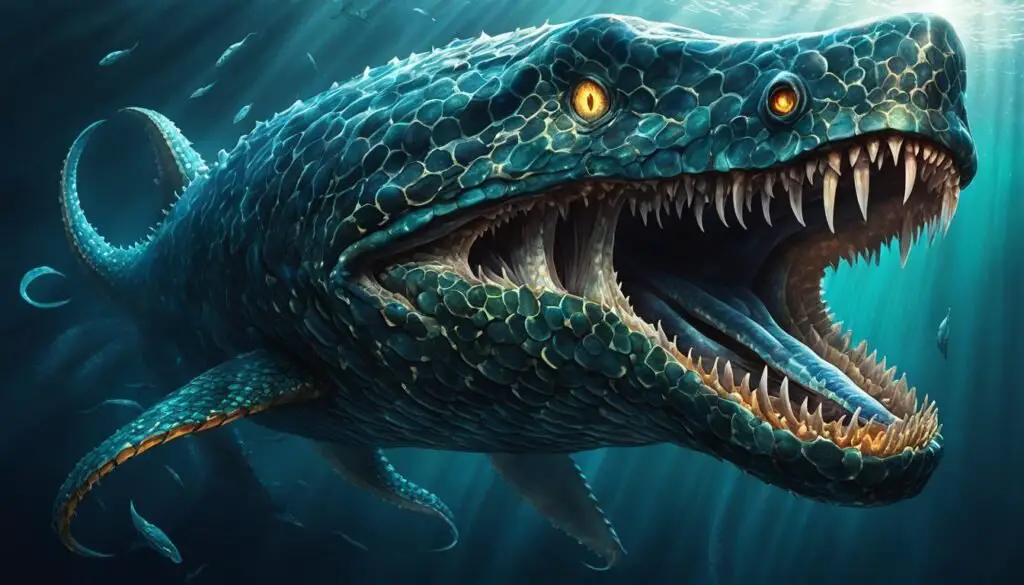
In exploring the roots of the Leviathan Axe, we must turn to the rich mythology of the Norse gods and heroes. According to ancient texts and legends, the axe finds its mention in various sources that delve into the world of Norse mythology.
Norse mythology is a complex tapestry of gods, goddesses, giants, and other mystical beings, with tales passed down through generations. The Leviathan Axe holds a significant place within this pantheon, symbolizing power, strength, and the interplay between realms.
In ancient Norse lore, the Leviathan Axe is often associated with Thor, the god of thunder. Thor, renowned for his might and bravery, wielded his fabled hammer, Mjolnir, with unparalleled strength. However, it is believed that the Leviathan Axe served as a counterpart to Mjolnir, crafted with frost-imbued power and capable of rivaling the lightning-infused abilities of Thor’s hammer.
Throughout Norse mythology, the axe represents a formidable weapon, embodying the essence of the chaotic and unpredictable forces of nature. It embodies the raw power of the primordial giants, intertwining with the divine prowess of the gods.
The significance and origins of the Leviathan Axe in Norse mythology are shrouded in myth and legend, adding to its mystique and allure. Its roots can be traced back to the ancient texts and stories that continue to captivate and inspire us to this day.
The Smithing Duo: Brok and Sindri’s Creation
One of the key elements that adds depth to the lore of the Leviathan Axe in the God of War series is its creation by the skilled dwarven smiths, Brok and Sindri. These legendary characters bring their exceptional craftsmanship and expertise to forge a weapon of immense power and significance.
The Dwarven Craftsmanship of Norse Weapons
Dwarves are renowned in Norse mythology for their exceptional skill in crafting weapons and artifacts. Brok and Sindri exemplify this mastery with their meticulous attention to detail and intricate artistry. The duo’s ability to harness the raw materials of the Nine Realms and shape them into awe-inspiring weapons is unparalleled.
Through their craftsmanship, Brok and Sindri create weapons that not only possess formidable strength but also embody the essence of Norse mythology. Their creations often contain enchantments and imbued properties that make them indispensable to those who wield them.
From the dwarven-forged swords to the Leviathan Axe itself, their weapons become the embodiment of both beauty and deadly power, making them essential tools for gods, heroes, and warriors alike.
Regrets and Legacy in God of War’s Lore
While Brok and Sindri’s craftsmanship is exceptional, their creations are not without their regrets. In the God of War series, it is revealed that the dwarven duo harbors a sense of remorse for their role in crafting the Leviathan Axe.
Through their interactions with Kratos, the protagonist of the game, it becomes clear that the creation of the axe holds significant weight in their hearts. The guilt stemming from past events adds a layer of complexity to the narrative, as both Brok and Sindri grapple with the consequences of their actions.
Furthermore, the legacy of the Leviathan Axe extends beyond its physical form. It becomes a symbol of transformation, redemption, and sacrifice within the God of War’s lore. The axe carries with it the weight of the past, serving as a constant reminder of the journey undertaken and the battles fought.
Ultimately, Brok and Sindri’s creation of the Leviathan Axe showcases the depth and richness of the God of War universe. It highlights the significance of dwarven craftsmanship in Norse mythology and explores the complex emotions and consequences associated with wielding such a powerful weapon.
Is the Leviathan Axe Real in Norse Mythology?
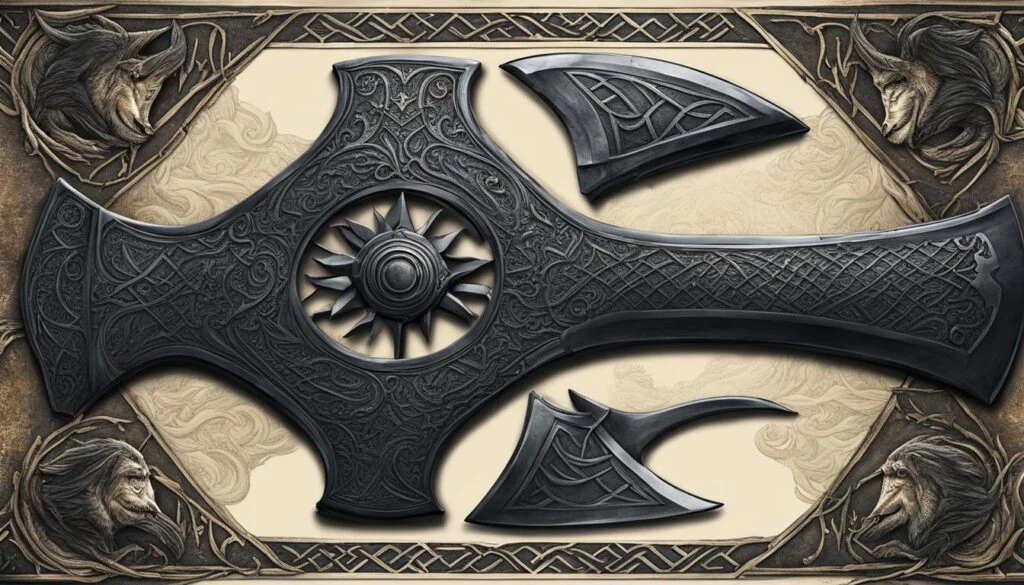
The question of whether the Leviathan Axe has a basis in Norse mythology or if it is purely a fictional creation for the God of War game series has intrigued fans and scholars alike. Let’s explore different perspectives and interpretations to determine the axe’s existence within the context of Norse mythological texts.
To delve into the reality of the Leviathan Axe, we need to examine the ancient sources and references that mention this legendary weapon. While Norse mythology paints a rich tapestry of gods, heroes, and epic battles, the specific mention of the Leviathan Axe may not be as prevalent as one would expect. This lack of direct references has led some to question its authenticity within the mythology.
However, it is important to note that Norse mythology is a complex and multifaceted body of literature. Interpretations and variations in the retelling of myths are not uncommon. Some experts argue that the absence of the Leviathan Axe in specific texts does not necessarily disprove its existence in Norse mythology. Instead, they propose that it may be a variant or an overlooked mention in lesser-known tales.
On the other hand, skeptics maintain that the Leviathan Axe is purely a creation of the God of War game series, designed to enhance gameplay and storytelling. They argue that attributing the axe to traditional Norse mythology would be anachronistic and misleading.
While the debate over the reality of the Leviathan Axe continues, it is important to recognize the profound impact it has had on popular culture. The weapon has become an iconic symbol of power and craftsmanship, captivating gamers and mythology enthusiasts worldwide.
As we navigate the realms of myth and reality, it is essential to appreciate the intricate blend of creativity and inspiration that the Leviathan Axe represents. Whether it exists in the ancient texts of Norse mythology or solely within the realms of fiction, its legacy and significance endure in our collective imagination.
The Symbolism Behind Kratos’ Choice of Weapon
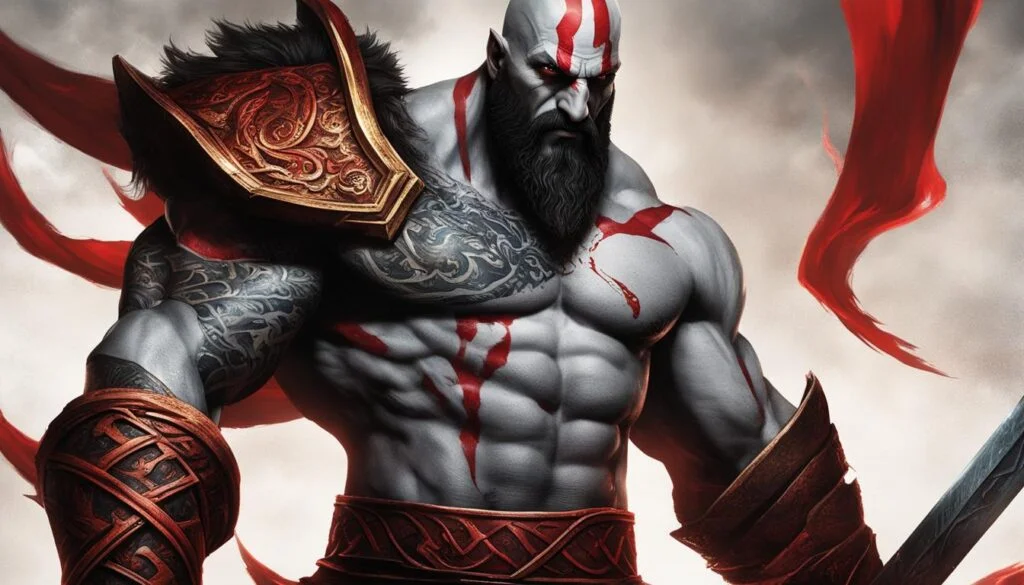
In the epic saga of the God of War series, the symbolism behind Kratos’ choice of the Leviathan Axe as his weapon carries profound meaning. It represents a transformative journey for the central character, a transition from chaos to purpose, and a tool for redemption.
Transition from Chaos to Purpose
Throughout the series, Kratos is initially portrayed as a chaotic and vengeful figure, driven by a thirst for revenge and consumed by anger. However, as the story unfolds, his journey takes a pivotal turn, leading him on a path of self-discovery and redemption.
His choice to wield the Leviathan Axe signifies a departure from his past, a conscious decision to leave behind the chaos that once defined him. The axe becomes a symbol of his commitment to finding a higher purpose and seeking redemption for his past actions.
The Leviathan Axe: A Tool for Redemption
The Leviathan Axe serves as a powerful tool for Kratos’ redemption and personal growth. It is not merely a weapon but a literal and metaphorical instrument through which he finds solace and redemption.
As Kratos wields the axe, he harnesses its power not only to vanquish his enemies but also to confront his own internal demons. The axe becomes a conduit for his transformation, a means to channel his violent past into a force for good.
Through the process of using the Leviathan Axe, Kratos learns to temper his anger and reckless tendencies, guiding him towards a path of self-discovery, understanding, and ultimately, redemption.
The symbolism behind Kratos’ choice of the Leviathan Axe is a testament to the depth and complexity of his character. It represents his transition from chaos to purpose and serves as a tool for his redemption and personal growth.
Redefining Mythos: God of War’s Impact on Norse Legend

In recent years, the God of War video game series has captivated players with its immersive storytelling and stunning visuals. But beyond its entertainment value, the game has had a profound impact on the perception and interpretation of Norse mythology.
God of War has reimagined and redefined various aspects of Norse mythos, breathing new life into ancient tales and characters. The game’s portrayal of gods, creatures, and legendary weapons like the Leviathan Axe has sparked a renewed interest in Norse legends among players and fans alike.
Through its narrative and presentation, God of War has influenced popular culture’s understanding of Norse mythology. By seamlessly blending elements of myth and reality, the game has created a unique and immersive experience that allows players to become fully immersed in the world of Norse legends.
From the epic battles with gods and monsters to the intricate exploration of Norse realms, God of War has sparked a resurgence in interest in Norse mythology. Players are now inspired to delve deeper into the rich tapestry of Norse legends, seeking to understand the stories, characters, and symbolism that have been masterfully redefined by the game.
In conclusion, the impact of the God of War video game series on Norse legend cannot be overstated. Through its innovative storytelling and immersive gameplay, the game has redefined mythos, offering a fresh perspective on ancient tales and characters. God of War stands as a testament to the power of video games as a medium for preserving and reimagining cultural heritage.
Interpreting the Prophetic Nature of God of War’s Norse World
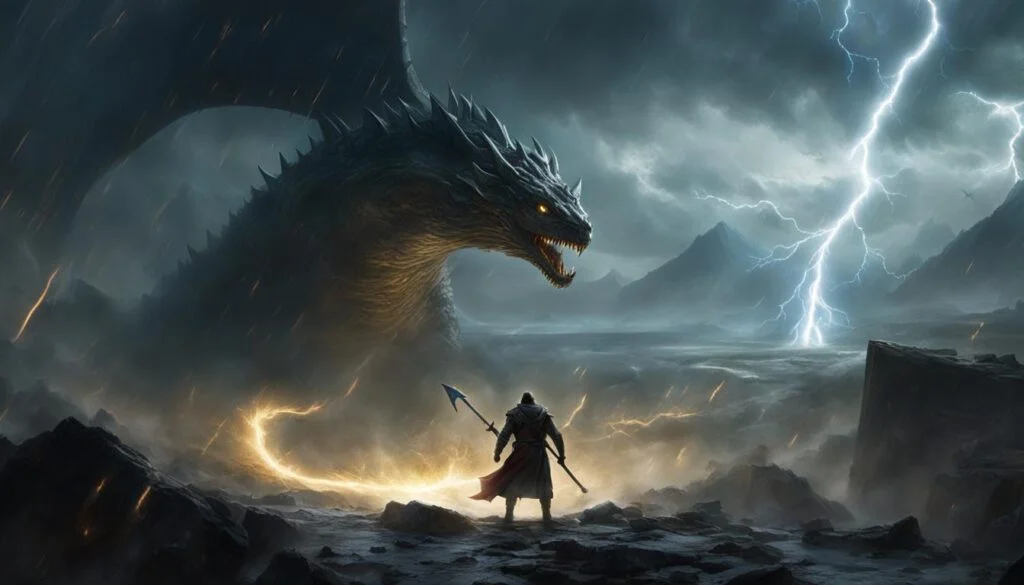
In the epic world of God of War, the prophetic nature of the Norse realm adds intrigue and depth to the storyline. Through its masterful storytelling, the game series unveils a rich tapestry of prophecies and foreshadowing that captivate players and keep them on the edge of their seats.
Utilizing various storytelling techniques, the God of War series explicitly reveals glimpses of the future, weaving an intricate web of fate and destiny. Prophetic dreams, visions, and cryptic messages propel the narrative forward, unraveling the mysteries of the gods and mortals alike.
The blending of fate and free will is a central theme in God of War, as the characters grapple with their predetermined paths while striving to carve out their own destinies. Balancing the influence of fate with the power of choice creates a compelling dynamic that allows players to immerse themselves in the complex moral dilemmas faced by the protagonist, Kratos, and his son, Atreus.
The prophecies and the blending of fate and free will in God of War tie together seamlessly, enriching the gameplay experience and leaving players eager to uncover the consequences of their choices. As players navigate the intricate web of destiny, they are confronted with the weight of their decisions and the impact they have on the unfolding events.
The prophetic nature of God of War’s Norse world adds depth, mystery, and excitement to the gameplay, immersing players in a captivating story that transcends the boundaries of myth and reality.
The Connection Between the Leviathan Axe and Kratos’ Destiny
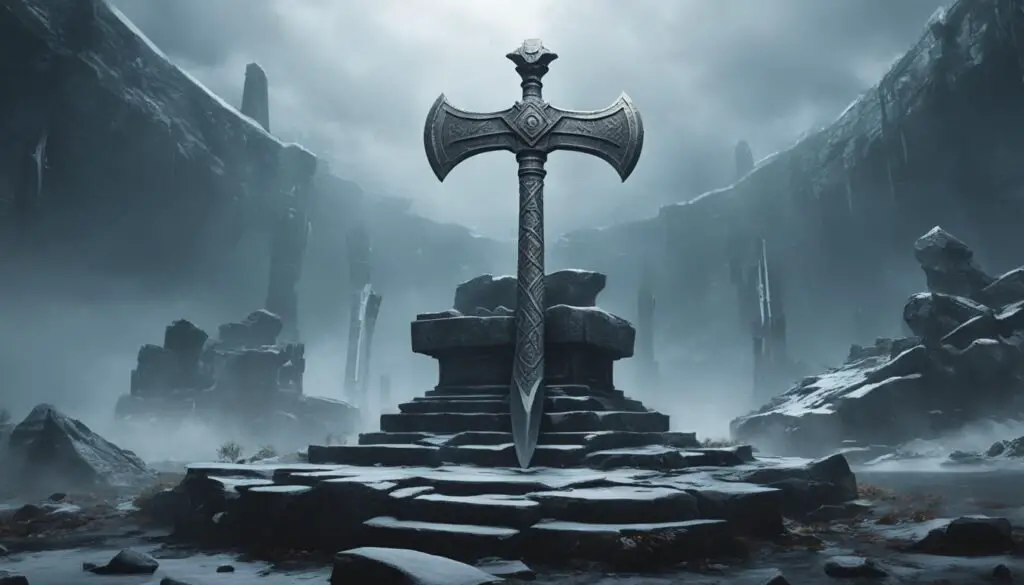
Throughout the God of War series, the Leviathan Axe holds a significant connection to Kratos’ destiny as a character. This powerful weapon acts as a catalyst for Kratos’ journey and transformation, shaping his path and defining his purpose.
Ax of Change: Kratos’ Journey and Transformation
The use of the Leviathan Axe marks a turning point in Kratos’ character development. As he wields this legendary weapon, he undergoes a profound transformation from a chaotic and vengeful figure to a purposeful and redemptive one.
With the Leviathan Axe, Kratos embarks on a journey of self-discovery and growth, learning to navigate the complexities of his past actions and forge a new path forward. This transformative journey is mirrored in the evolution of his combat abilities and the development of his relationships, particularly with his son, Atreus.
Carrying the Weight of the Past: The Leviathan’s Burden
The Leviathan Axe represents not only Kratos’ physical weapon but also the weight of his past and the burden he carries. It serves as a constant reminder of the consequences of his actions and the hardships he has endured.
Symbolically, the Leviathan Axe embodies the weight of Kratos’ sins and the responsibility he carries as he navigates the realms of gods and mortals. It serves as a tangible representation of the struggles he faces and the choices he must make in order to shape his own destiny.
Leviathan vs Mjolnir: The Showdown of Norse Powers
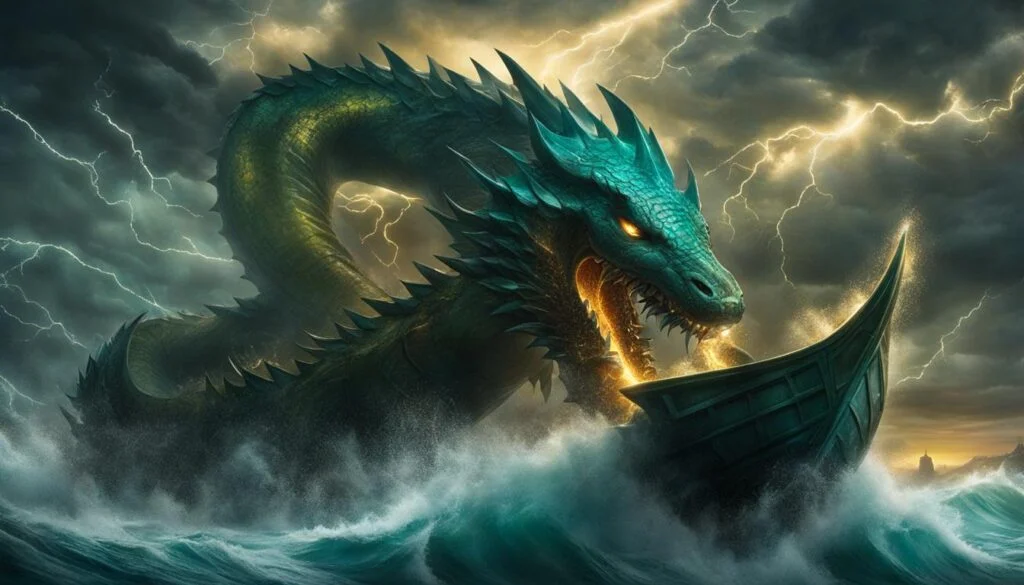
In the realm of Norse mythology and the God of War series, a thrilling clash looms between two iconic weapons – the Leviathan Axe and Mjolnir, Thor’s legendary hammer. These mighty artifacts embody the raw power and essence of the Norse gods, each with its own unique abilities and origins.
On one side, we have the Leviathan Axe, wielded by the formidable Kratos. Crafted by the skilled hands of the dwarf smiths, Brok and Sindri, this axe has immense frost-imbued power, capable of freezing anything it strikes. Its journey intertwines with Kratos’ personal redemption and reflects his transformation from a vengeful figure to a purposeful hero.
On the other side stands Mjolnir, the enchanted hammer of Thor. Forged in the heart of a dying star, this weapon grants its wielder control over thunder and lightning, making it the epitome of Norse power. With Mjolnir, Thor defends Asgard and upholds the order of the Nine Realms.
As these two iconic weapons prepare to clash in the God of War series, the implications are vast and the outcome uncertain. Will the Leviathan Axe’s frost-imbued might be enough to overcome the thunderous blasts of Mjolnir? Or will Thor’s legendary weapon prove too much for Kratos’ formidable arsenal?
This impending showdown between the Leviathan Axe and Mjolnir will test the limits of Norse power, shaping the destiny of the characters involved and reverberating throughout the God of War narrative. The clash of these mighty artifacts will have fans on the edge of their seats, eagerly anticipating the outcome of this epic confrontation.
Loki’s Role and the Intrigue of the Leviathan Axe
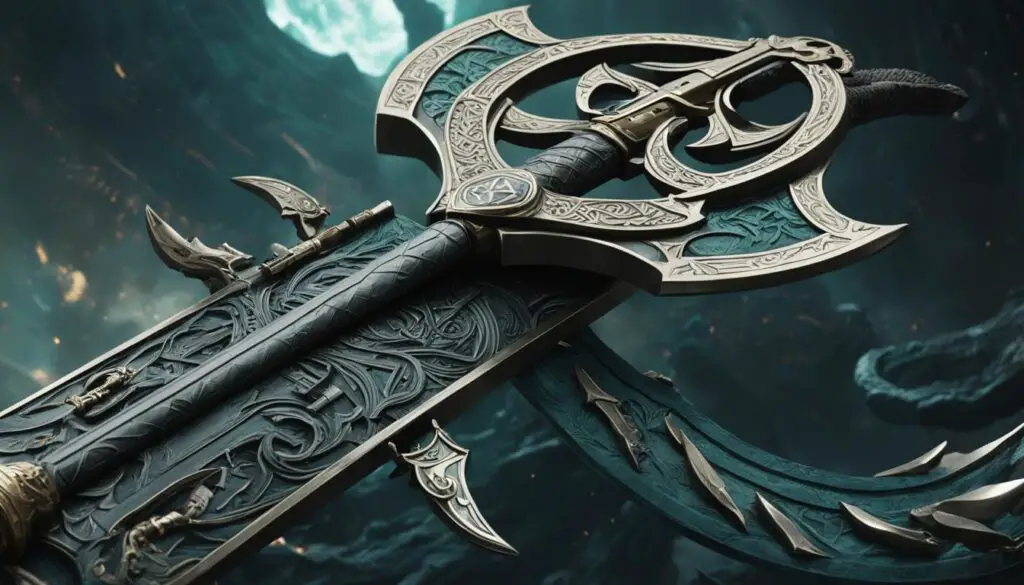
In the God of War series, Loki plays a significant role, manifested as Atreus, and his connection to the Leviathan Axe adds to the intrigue of the narrative. As the son of Kratos, Atreus is not only a pivotal character but also carries the weight of his legacy. The Leviathan Axe, a powerful weapon forged by the dwarf craftsmen Brok and Sindri, becomes a symbol of Atreus’ journey and identity.
Atreus’ Identity Crisis and its Consequences
Throughout the game, Atreus grapples with an identity crisis, torn between his mortal and divine heritage. This internal struggle has profound consequences for the story’s development, impacting his relationship with Kratos and the world around them. As Atreus seeks to understand his true nature, the Leviathan Axe becomes a tangible representation of his quest for self-discovery.
The Future of the World Serpent and the Axe’s Impact
As the narrative unfolds, the Leviathan Axe’s connection to Atreus reveals its potential impact on the future of the World Serpent, Jormungandr. The mysterious origins and powers of the axe intertwine with the fate of the serpent, setting the stage for further intrigue and exploration. The axe’s role in shaping the events to come demonstrates its significance beyond its physical prowess.
In conclusion, the dynamic relationship between Loki, the Leviathan Axe, and Atreus’ identity crisis adds depth and complexity to the God of War series. The narrative intertwines these elements in a way that captivates players, inviting them to unravel the secrets of both character and weapon. As the story continues to unfold, the impact of the Leviathan Axe on the world of God of War promises to be a thrilling journey filled with further surprises and revelations.
Conclusion
Throughout this article, we have delved into the origins, symbolism, and impact of the Leviathan Axe in both Norse mythology and popular culture. We explored the question of whether the Leviathan Axe is a myth or if it has roots in Norse reality.
By examining its introduction in the modern media landscape, particularly in the God of War video game series, we saw how the Leviathan Axe has become an iconic weapon. Its connection to Mjolnir, Thor’s legendary hammer, further highlights its significance within Norse mythology.
While the roots of the Leviathan Axe can be traced back to Norse mythology, there is still debate over its actual existence. Its portrayal in the God of War games has sparked fascination and intrigue, blurring the lines between myth and reality.
Ultimately, the legacy of Kratos and his Leviathan Axe extends beyond the confines of the game. The axe has made a lasting impact on popular culture, becoming a symbol of power, redemption, and the ongoing fascination with Norse mythology. It continues to captivate fans and serve as a testament to the enduring appeal of this legendary weapon.
FAQ
Is the Leviathan Axe mentioned in Norse mythology?
The Leviathan Axe does not have direct references in ancient Norse mythology. It is primarily a creation for the God of War video game series.
What is the Leviathan Axe’s significance in the God of War games?
In the God of War series, the Leviathan Axe plays a crucial role in the narrative, representing the character’s transition from chaos to purpose and serving as a tool for redemption.
Does the Leviathan Axe have any basis in Norse mythology?
While there is no direct evidence of the Leviathan Axe in Norse mythological texts, the game series incorporates elements and characters from Norse mythology, adding its own creative interpretation.
How does the Leviathan Axe symbolize Kratos’ redemption in the God of War games?
The Leviathan Axe represents Kratos’ journey towards redemption and personal growth. Its use as a powerful weapon reflects his transformation from a vengeful figure to a purposeful and heroic character.
How has the God of War series influenced the perception of Norse mythology?
The God of War games have reimagined and redefined aspects of Norse mythos, including the portrayal of gods, legendary weapons like the Leviathan Axe, and creatures, which have influenced popular culture’s understanding of Norse legends.
What prophetic elements are present in the God of War series?
The God of War series incorporates storytelling techniques to convey prophecies and foreshadowing of future events. It explores themes of fate and free will within the context of the Norse world.
How does the Leviathan Axe shape Kratos’ destiny in the God of War series?
The Leviathan Axe plays a significant role in shaping Kratos’ journey and transformation throughout the games. It represents the burden of his past actions and his duty to carry on despite the weight.
How does the Leviathan Axe compare to Thor’s hammer, Mjolnir?
The Leviathan Axe and Mjolnir hold different powers, origins, and significance within Norse mythology and the God of War series. While both are iconic weapons, they have distinct roles and abilities.
What is the connection between the Leviathan Axe and Atreus in the God of War series?
The Leviathan Axe is deeply connected to Atreus, who manifests as the god Loki in the game. The axe’s intrigue relates to Atreus’ identity crisis and has implications for the future of the World Serpent.
What is the lasting impact of Kratos and the Leviathan Axe in popular culture?
Kratos and the Leviathan Axe have become iconic symbols in the realm of pop culture. Their presence in the God of War series has left a significant impact on fans and established a lasting legacy.


